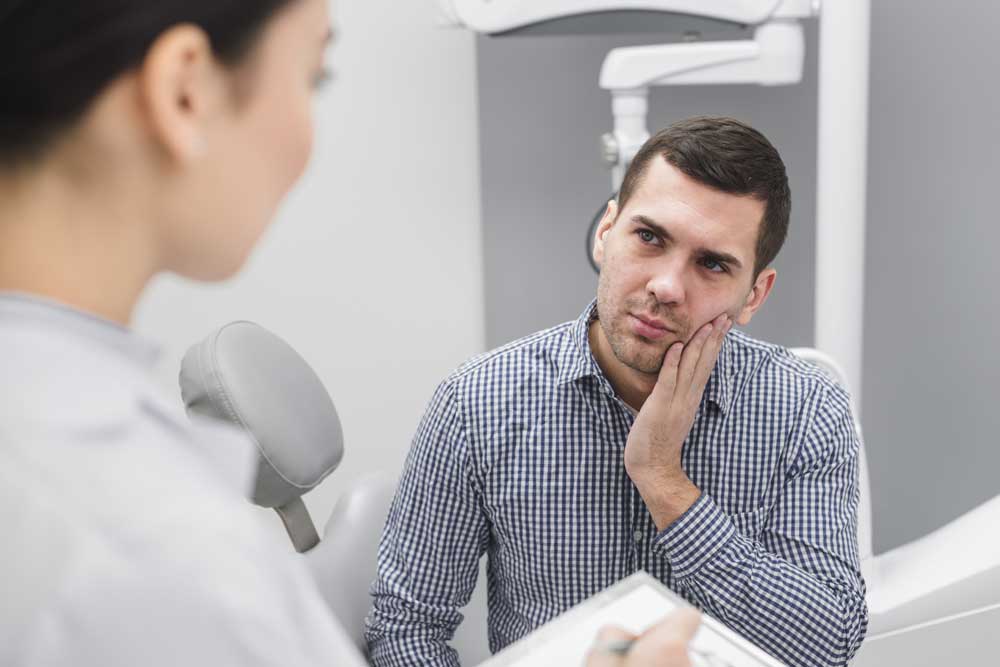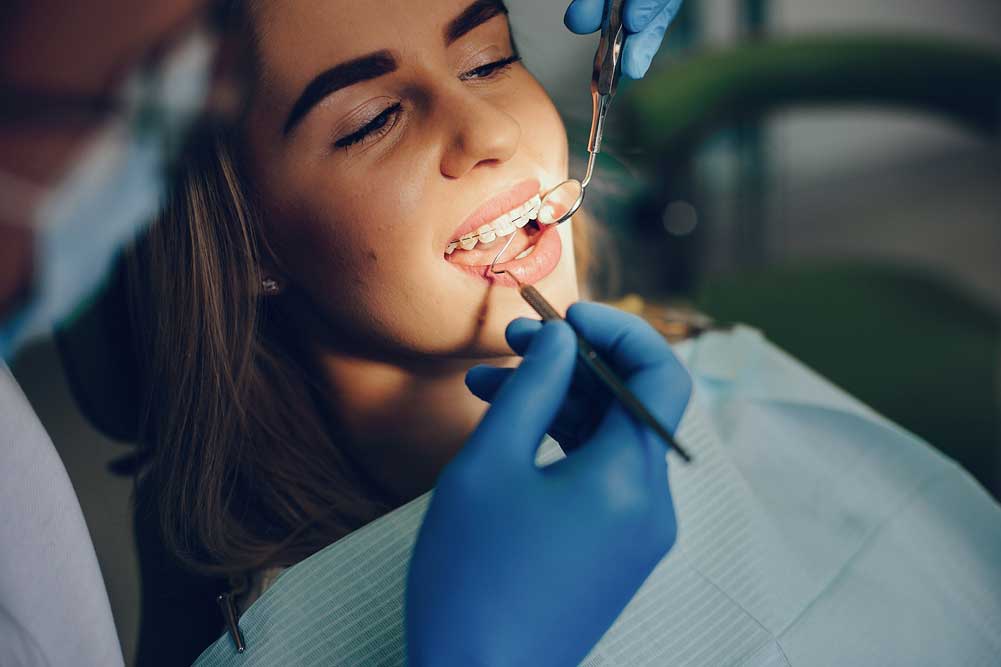
You unwrap your favorite ice cream bar and can already taste that creamy vanilla ice cream with the hard chocolate coating. You take that first bite, mouth-watering, and…OUCH!
Intense, throbbing pain shoots through your molar – and throughout your entire body. Maybe you just banged your tooth. Maybe it’s something worse.
Occasional mouth pain may just indicate a sensitivity to hot or cold, which can become increasingly common as you get older. But different types of toothaches – and other symptoms associated with this pain – can be indicators that you’re developing one of several serious health conditions that need immediate treatment.
Don’t just pop ibuprofen and assume it’ll go away. Read on to learn about 9 signs that indicate you need to take your oral problems seriously.
1. It Hurts When You Chew
If your tooth gives you a sharp, shooting pain when you take a bite of something, it may be cracked or damaged. If you don’t remember some kind of trauma – getting hit in the mouth, biting down on a Gobstopper – this crack may have occurred from grinding your teeth at night or clenching your jaw too intensely.
Exposed nerves from a cracked tooth produce this pain and if left untreated, can cause the spread of bacteria and lead to an infection.
It might also hurt to chew because your tooth enamel has worn down. Tooth enamel protects your teeth’s nerves from outside factors that can cause pain.
If the enamel wears down, you’ll notice increased sensitivity to hot or cold foods, which can cause that instant zing of pain when you chew.
Treatment: A cracked tooth must be addressed immediately to prevent infection or tooth decay. Visit your dentist so he or she can fix it. If you’re experiencing a loss of tooth enamel, you’ll need to examine your dietary habits and gastrointestinal health.
There’s no way to get tooth enamel back once it’s gone, so the sooner you make healthy lifestyle changes, the less likely you are to experience pain when chewing in the future.

Difficulty in chewing food- image attribute Medical photo created by freepik
2. Your Gums Bleed When You brush
Bloody gums while brushing may be a sign of gum disease, a build-up of plaque and bacteria on the gums that causes your gums to recede from your teeth.
In the mildest cases, it results in bloody and slightly receding gums. In severe cases, it can lead to tooth loss, decay, and loos prosthesis like dental Implant.
Treatment: Regularly brushing at least twice a day and flossing once a day (don’t lie to your dentist! She knows when you do!) can generally prevent gum disease.
A professional deep clean once every six months can also keep this disease at bay. If your tooth pain is associated with bloody gums, He or she may suggest additional oral health care, such as a daily mouthwash, or a procedure to save your teeth in severe cases.
3. You Feel an Intense Throbbing Pain
An intense, throbbing pain in your tooth that isn’t associated with eating may indicate you’re dealing with a tooth infection. A tooth infection occurs when bacteria invade the tooth’s pulp, which is the inner part of the tooth where nerves and blood vessels are located.
Infections are serious because they can spread to other parts of your body if left untreated. Poor dental hygiene, dry mouth, or a diet that’s high in sugar can cause tooth infection.
Treatment: If you’re feeling an intense, throbbing pain in your tooth, make an emergency dentist appointment as soon as you can. Your dentist needs to treat the infection by root canal treatment so it doesn’t spread, which may mean draining the abscess and prescribing antibiotics.
4. You Feel pain due to wisdom tooth
If your tooth pain is associated with the backside of the jaw, it may indicate that your wisdom teeth are giving you trouble. Your wisdom teeth do most of their growing and changing when you’re 16 to 23 years of age.
If they seemed to grow normally throughout these years, your dentist at the time may have opted to let them stay in.
However, when you get older, they can still begin to crowd your other teeth. If your wisdom teeth grew in at an angle, they’re more susceptible to infections or tooth decay, which can cause other problems in your mouth if they aren’t taken out.
Treatment: Go see your dentist so he or she can take x-rays of your mouth and see what’s going on with your wisdom teeth. If they’re starting to crowd your other teeth or don’t look healthy, you may need to get them removed for your tooth pain and pressure to finally go away.
5. Your Mouth Is Dry
Saliva protects you from bacteria and a dry mouth can exacerbate any problems you’re having with your teeth since it allows bacteria to grow; the bacteria have a perfect environment to thrive in. Dry mouth can be caused by certain medications and can make it hard to spit, talk, or speak.
Treatment: You should avoid cigarettes, alcohol, and caffeine because they can make your dry mouth worse. Practice regular brushing and flossing and try to keep your mouth salivated by sipping water or sucking on sugar-free hard candy.
Your dentist can also prescribe medications to counteract your dry mouth and keep your teeth healthy.
6. Your Tooth Feels Loose
If you have tooth pain and the tooth itself feels loose, it’s a sign of advanced gum disease, also called periodontal disease.
We already know how bad this disease is for your mouth and the trouble it can cause when it spreads, so it’s important to get it taken care of right away. A loose tooth can also occur if you have a cavity or tooth decay that you haven’t had treated.
Treatment: Visit your dentist so he or she can figure out if you have periodontal disease or cavities. The sooner you get treatment for the problem, the more likely it is your tooth can be saved.
7. Teeth are Sensitive to Hot and Cold
Mild sensitivity to hot and cold is normal for many people, especially as you age. However, intense, throbbing pain when biting into hot or cold food is something to be concerned about.
This sensitivity may be due to exposure of the root structure in one or more of your teeth. This leaves the nerves of your teeth completely exposed, so it makes sense that hot or cold would trigger a painful reaction.
Treatment: Be sure you aren’t brushing too hard and try to stay away from extremely hot or cold foods. Use a toothpaste designed for sensitive teeth and go see your dentist as soon as possible to see if you have exposed roots that can be fixed.

Dental checkup- image attribute by prostooleh
8. It Hurts When You Eat Sweets
If your toothache is only brought on by sugary foods, a weakening of your tooth enamel may be to blame. Our tooth enamel disappears as we age. But if you brush too intensely or with a hard-bristled toothbrush, you could be making your tooth enamel wear off prematurely.
Without the enamel, the sugar in sweet foods can make direct contact with the nerve endings in your teeth, causing pain.
Treatment: Ask your dentist about your sensitivity to all things sweet. You may need to use a toothbrush with softer bristles and you may need to adopt a more gentle brushing technique.
Your dentist may also suggest toothpaste specifically designed for sensitive teeth to ensure the rest of your enamel isn’t threatened.
9. Your Breath Smells Bad
If your tooth pain is accompanied by the bad breath that won’t go away, it’s another indicator that you’re suffering from gum disease. When bacteria grow on your gum line and your gums begin to recede from your teeth, it can produce an unpleasant smell.
Even if you don’t notice any changes in your gum line, your dentist can identify gum disease with a tiny ruler that measures small pockets in your gums.
While bad breath doesn’t seem like a threat to your health, gum disease and a mouth full of bacteria can increase your risk for serious health conditions. Poor oral health can be linked to an increased risk for Endocarditis, Pregnancy and birth complications, Cardiovascular disease, Pneumonia.
Treatment: If you have chronic bad breath, visit your dentist for a thorough cleaning and x-rays. If gum disease is the culprit, you need to stick to a stricter oral health routine that includes regular flossing and brushing.
Regular cleanings and check-ups are also important to prevent gum disease from getting worse. Your dentist may be able to prescribe mouthwash or toothpaste designed to kill the bacteria causing your gum disease and bad breath.
About The Author:
Dr. Divyesh Patel work at Sanjivani Dental clinic-Rajkot which is known to provide quality care with affordable treatment options. He holds a degree in dental surgeon (BDS) and does a fellowship program in general dental awareness. He is practicing dentistry and oral health program at his clinic and surrounds areas since 2012.




